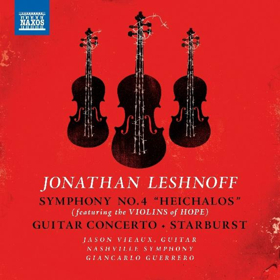Nashville Symphony, Giancarlo Guerrero, Jason Vieaux Present World Premiere Recordings of Works by Jonathan Leshnoff

On May 2, 2019, Holocaust Remembrance Day, Naxos will release world premiere recordings of music by composer Jonathan Leshnoff performed by theNashville Symphony with conductor Giancarlo Guerrero and guitarist Jason Vieaux. The centerpiece of this singular new collection is Leshnoff's Symphony No. 4 "Heichalos," which was written for theViolins of Hope, a collection of restored instruments played by Jewish musicians during the Holocaust.
Jewish spirituality has provided an inexhaustible source of inspiration for Leshnoff, as the works on this recording illustrate. Commissioned by the Nashville Symphony for its Violins of Hope Nashvillecommunity initiative, Symphony No. 4 "Heichalos" is based on an ancient mystical text, which Leshnoff tapped as a source of inspiration for exploring the powerful resonances of these historic instruments. Restored by Israeli luthiers Amnon and Avshi Weinstein, the Violins of Hope have been the subject of a bestselling book and acclaimed documentary, and today they stand as symbols of resilience and survival in the face of unimaginable suffering. This recording marks the first time the Violins of Hope have been featured on a commercial album release.
"I include reflective questions in the score to exude deep meditation from the musicians," Leshnoff says of his Symphony No. 4. "I see the Violins of Hope as the physical embodiment of Jewish survival. And I see my symphony as a representation of the spiritual and ethical embodiment of this Jewish survival."
Jason Vieaux is the soloist on Leshnoff's Guitar Concerto, a work the composer calls "an exploration of worlds, from its mysterious beginnings to its fiery, dance-inspired finale." Though he had already composed 12 concertos, Leshnoff does not play the guitar himself, so this commission from the Baltimore Symphony and Marin Alsop presented a unique challenge. "It's notoriously difficult to write for the instrument unless you play it," Leshnoff says. Nonetheless, he immersed himself in studying the literature, crafting a work Nashville Symphony's Music Director Giancarlo Guerrero considers "one of the greatest additions to the guitar and orchestra repertoire in recent years."
"I am so pleased to have recorded this exhilarating piece of music - and with such a fantastic orchestra," says Vieaux. "It is quite beautiful, and in a technical sense even advanced some of my chops along the way! I have never had to practice any piece for performance more perhaps than this one, but it was well worth the effort, because the concerto has made me a better guitarist."
Starburst, the brief work that closes this recording, "is a sparkling display of the infinite energy of the cosmos," says the composer. The piece was premiered in 2010 by the Baltimore Symphony and continues to be Leshnoff's most performed work, presented by scores of orchestras as an energetic concert-opener.
"This recording showcases different sides of Jonathan Leshnoff's compositional style," says Giancarlo Guerrero. "Violins of Hope had incredible social impact here in Nashville and was one of the most worthwhile initiatives the Nashville Symphony has ever undertaken. It provided us the perfect opportunity to commission Jonathan Leshnoff to write something for these historic instruments, and his Symphony No. 4 gives us the chance to hear so much more of his musical language. He was not afraid to explore new sounds and ideas, and the results are tremendously powerful. Along with his Guitar Concerto and Starburst, this breathtaking new work reveals his profound depth as an artist, and this collection reminds us of the ways that music has the power to keep history alive, to give voice to the voiceless, to heal, to transcend and to express what cannot be conveyed through language."
Comments
Videos

